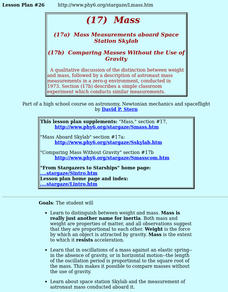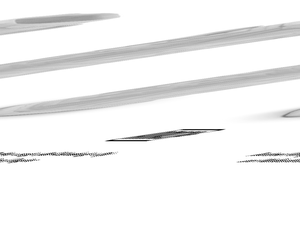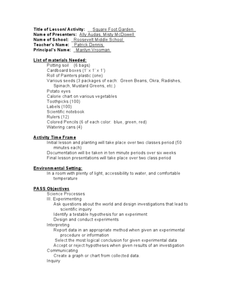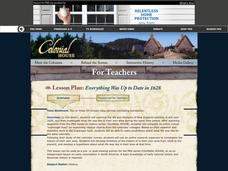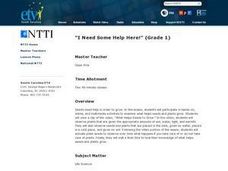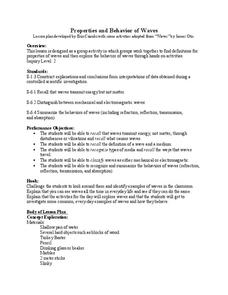Curated OER
Mass
Young scholars participate in a qualitative discussion of the distinction between weight and mass, followed by a description of astronaut mass measurements in a zero-g environment.
Curated OER
The Battle of the Battlefields
Students simulate the role of a presidential analysis group to research a location for a Revolutionary War museum. They conduct research, and write a summary of their findings to present to the President.
Curated OER
Science: Vectors
Students solve vector problems and identify the x and y coordinates. They determine if the coordinates are positive, negative, or zero. Students solve problems and convert the x and y coordinates to magnitude and direction.
Curated OER
Textured Pottery using Self-Hardening Clay and Multicultural Design
Young scholars create textured pottery. In this multicultural arts lesson plan, students follow step-by-step directions to create textured pottery with a multicultural design out of self-hardening clay.
Curated OER
Sunflower Sundance
First graders study sunflower plants and identify its parts. They plant sunflower seeds and watch them grow and make sunflowers out of paper plates and colored paper. They watch videos and visit websites about sunflowers.
Curated OER
Decisions, Decisions, Decisions
Students examine graphs to find the most appropriate for various kinds of data. In this graphing lesson, student create bar, line and circle graphs. Students create graphs electronically and manually interpreting the data.
Curated OER
Let's Get Organized
Sixth graders identify table and each of its parts, including cell, column, row, header, and formula bar. Students then explain how tables are used to store and organize information in database, organize and categorize information...
Curated OER
Square Foot Garden
Students plant a garden and keep track of it. For this geometrical garden lesson, students collect data from their garden twice a week. They graph their finding and figure out how many square feet of growing space each person needs...
Curated OER
Funtastic Fractions
Learners discover fractions by creating models. In this fractions lesson, students read Give Me Half! by Stuart J. Murphy and view a video about what fractions actually represent. Learners divide a square piece of paper a certain amount...
Curated OER
See Spot Run
Students identify several properties of water as a universal substance, describe the composition of several complex color mixtures and separate the components of dye using chromatographic technique.
Curated OER
Introduction To Film Editing
Students are introduced to the role of a film editor and to two common film-editing techniques: continuity editing and montage (discontinuity) editing. By viewing video clips, students identify and define these two editing styles.
Curated OER
Everything Was Up to Date in 1628
Students examine the life and lifestyles of New England colonists in the year 1628, and then investigate what life was like in their own area during the same time period. After watching segments from the PBS history series, "Colonial...
Curated OER
I Need Some Help Here!
First graders describe what help seeds need to grow, including light, water, good soil, and warmth, observe and discuss what happens when seeds do not have help, and state similarities and differences among seed growth.
Curated OER
How to Float an Egg
Use the scientific method to experiment with an egg. Your class can examine buoyancy and density by finding how many spoons of salt are needed to float an egg. They can predict, experiment, record data, and analyze results.
Curated OER
"Pray, Why Speakest Thou Thusly?"
Examine popular language and slang and how they have changed over the course of American history. Conduct Internet research, use an online interactive Colonial House website to translate 17th century language into 21st century language,...
Curated OER
Noncombatancy and the Seventh day Adventist Church
Upper graders investigate how the Seventh Day Adventists are objectors to the practice of war. The lesson covers the Civil War and examines the church's position about the practice of war. The research extends to modern wars and learners...
Curated OER
Jamestown Changes
Students examine how the Jamestown settlement changed the first few years after it was founded. They take a virtual field trip of Jamestown, read primary source documents, discuss census information, and write a summary of changes in...
Curated OER
Sediment Tubes
Students observe how different density soils and rocks behave in wind and in water. They make predictions and careful observations as they explore sediment transport and sediment rates in streams and rivers.
Science Friday
Colorful Chromosomes
Everything is in the genes. Individuals observe 14 different traits of themselves. Using pipe cleaners and beads, the learners create models of a chromosome representing their traits. The class then compares and contrasts everyone's...
Curated OER
Angles: Angles, Angles, Everywhere
Students estimate and accurately measure the size of angles communicate with the appropriate geometric terms and symbols to describe and name angles, lines, line segments, rays
Curated OER
Bar Me In
Fourth graders watch a video about constructing bar graphs. They create their own graph and interpret it.
Curated OER
The Search for Centimeters
Investigate the length of various objects in metrics! In this measurement lesson, 2nd graders estimate and find the length of objects in the classroom using centimeters.
Curated OER
Avalanche
Pupils investigate the concept of avalanches and how they effect people who use the slopes. They conduct research using multiple resources that includes the internet in order to create a final oral presentation.
Curated OER
Properties and Behavior of Waves
High schoolers explore the different properties of waves. In this physics lesson, students differentiate mechanical and electromagnetic waves. They explore each lab station and write their observation about the wave behavior they see.
